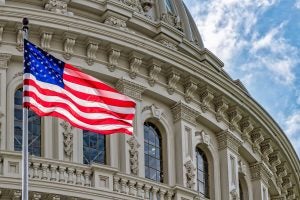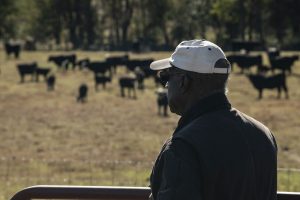One of the most fascinating considerations regarding the 2023 farm bill is that it isn’t just some casual piece of legislation that is voted on at a local cattlemen’s meeting. It is a massive bill that requires all the due diligence to get passed that matches Elle Woods’ tireless efforts in Legally Blonde. It is no small feat to renegotiate on a nationally political level such an important body of work that is worth about $1 trillion.
One of the many moving parts of getting a new farm bill to be passed by Congress and signed by the president is the introduction of marker bills. Four months into the year of the farm bill, and multiple rounds of marker legislation have either happened, or will before month’s end.
The most likely path for an idea to be placed into the final draft of the farm bill is through marker bills. What this is, is essentially a piece of legislation, or rather a lot of smaller pieces, that is passed on the floor but not kept as a standalone bill. It is meant to then garner support over a span of time in order to be included into a larger bill — in this instance, the farm bill.
Advocates for each marker bill work to build awareness in hopes that enough support is given to include it in the final draft of the farm bill. Having ideas broken down in this manner makes it easier for advocates and support groups to draw more attention to legislation they prioritize, thus making it a little easier to get it into the farm bill.

There is a more formal process to getting a marker bill introduced. According to this Marker Bill 101 Handout the process looks like this:
- An interest group has a policy idea, they bring it to the offices of Members of Congress (MoCs) who have shown interest in taking leadership on that issue and work together to develop the bill language.
- A MoC has an idea and asks for a group’s help in crafting the marker bill.
- Another ally organization develops a marker bill with one of their Congressional champions.
“Once drafted, marker bills are officially introduced by Members of Congress,” the document states. “The person who introduces a bill is called the ‘original sponsor.’
“Once a bill has been introduced, other lawmakers in that chamber can show support by becoming a ‘cosponsor’ of the bill. The more cosponsors a bill has, especially if there are both Democrat and Republican cosponsors, the easier it is for its original sponsor to make the case for including its ideas in the relevant omnibus legislation.”
A simplified timeline falls into a handful of phases, according to this fact sheet: Phase 0 is bill development, Phase 1 is bill introduction, Phase 2 includes pushing for bill support, and Phase 3 entails being included into the omnibus package.
So, what are some marker bills out there currently?
Perhaps one of the most controversial is The America Works Act of 2023. It’s no secret that the SNAP program, as part of the larger Nutrition title, which takes up a whopping 80 percent of funding of the farm bill, is one that has caused tension between party lines for decades. However, with an uncertain economy following a pandemic, and a bigger need to support hungry families, there is a divide between spending too much on the nutrition title, and not spending enough.

According to the website of Rep. Dusty Johnson (R-SD), The America Works Act:
- Emphasizes and amends work requirements for Able Bodied Adults Without Dependents (ABAWDs) requiring childless adults, unless exempted, to work or participate in work-related training or education, for at least 20 hours per week in order to receive Supplemental Nutrition Assistance Program (SNAP) benefits.
- This bill maintains current law which states that ABAWDs are subject to a three-month limit of SNAP benefits unless they work 80 hours per month.
- Raises the age limits of an ABAWD from 18 to 49 to 18 to 65, consistent with the age individuals become eligible for Medicare.
- Employment projections from the Bureau of Labor and Statistics show that individuals over the age of 55 are projected to assume over 25 percent of the workforce in 2022.
- The America Works Act of 2023 eliminates states’ ability to carry over exemption waivers from year to year, reducing instances of stockpiling and hampering abuses of the law.
- States are currently allowed robust flexibility in managing their SNAP population, with 12% of state caseloads eligible for exemptions from the work requirements. Johnson’s bill maintains that flexibility, but doesn’t allow states to carry over exemptions year after year.
Politico summarized the distress caused by the Nutrition title in a recent newsletter, emphasizing the divide between party lines over the largest component of the farm bill.
“There’s been a lot of action in the SNAP arena lately, with Rep. Dusty Johnson (R-S.D.) opening the first salvo with a proposal to expand work requirements in the program. Prominent Senate Republicans like Minority Whip John Thune (R-S.D.) have described the plan as reasonable and a possible path to savings in the farm bill, but powerful Democrats including House Ag Committee ranking member David Scott (D-Ga.) have lambasted it publicly.”

Another marker bill, this one introduced by Rep. Alma Adams (D-NC), is the Justice for Black Farmers Act, which will:
- End Discrimination within USDA: Creates an independent civil rights oversight board to review appeals of civil rights complaints filed against USDA, investigate reports of discrimination within U.S. Department of Agriculture, and provide oversight of Farm Service Agency County Committees. The Act also creates an Equity Commission and reforms the USDA Office of Civil Rights, including by placing a moratorium on foreclosures during the pendency of civil rights complaints.
- Protect Remaining Black Farmers from Land Loss: Increases funding for the Heirs’ Property Relending Program at USDA to provide Black Farmers pro bono assistance, succession planning, and support for development of farmer cooperatives. The Act also creates and funds a new bank to provide financing and grants to Black farmer and rancher cooperative financial institutions, and forgives USDA debt of Black farmers who filed claims in the Pigford litigation.
- Restore the Land Base Lost by Black Farmers: Creates a new Equitable Land Access Service within USDA to acquire farmland and provide land grants of up to 160 acres to existing and aspiring Black farmers. To help ensure their success, these new Black farmers will be provided access to USDA operating loans and mortgages on favorable terms.
- Create a Farm Conservation Corps: Creates a program for young adults from socially disadvantaged communities to be provided the skills to pursue careers in farming and ranching. Participants will be paid by USDA to serve as on-farm apprentices at no cost to socially disadvantaged, beginning, and organic farmers and ranchers with annual gross farm income of less than $250,000. Black participants who gain experience through this program will have priority for land grants.
- Empower HBCUs and Advocates for Black farmers: Provides resources to 1890s and nonprofits who serve Black farmers to offer pro bono assistance in identifying land for USDA to purchase and provide as land grants; help to new Black farmers in getting up and running; technical training; and other assistance including succession planning and legal assistance. The Act also provides new funding to HBCUs to expand their agriculture research and courses of study.
- Assist All Socially Disadvantaged Farmers and Ranchers: Increases funding for USDA technical assistance and for programs such as the Conservation Stewardship Program and Rural Energy for America Program, and gives priority for these programs, as well as increased access to capital, to all socially disadvantaged farmers and ranchers.
- Enact System Reforms to Help All Farmers and Ranchers: In order for new and existing Black farmers to have a real chance to succeed and thrive, the Justice for Black Farmers Act substantially reforms and strengthens the Packers and Stockyards Act to stop abusive practices by big multinational meatpacking companies and protect all family farmers and ranchers.
And yet another marker bill, called the Strengthening Local Processing Act, has been re-introduced by U.S. Reps. Chellie Pingree (D-ME) and Jim Baird (R-IN) and U.S. Sens. John Thune (R-SD) and Sherrod Brown (D-OH), as a show of bipartisan support to “increase the federal cost share for state facility inspections from 50 to 65% and for Cooperative Interstate Shipment (CIS) facilities from 60 to 80%, thus encouraging more states to operate state inspection programs and participate in CIS.”
Over the next few months, Congress members will continue to push marker bills, and hopefully gain enough support to see them put into the final draft of the 2023 farm bill.
I have stressed in my farm bill pieces already, but this is the time when it’s crucial to contact your own lawmakers to voice to them which marker bills you support. Most often, organizations you are a member of have a list of legislation they support and the information needed to contact your lawmakers.
Markie Hageman Jones majored in agribusiness at Fort Hays State University. She is actively involved in her state Cattlemen’s Association, Young Farmers chapter, and National Cattlemen’s Beef Association. Her AGDAILY.com articles can be found here.



